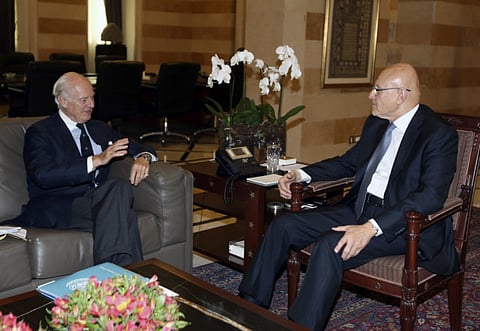Hezbollah militants clash with Al Nusra in Bekaa
Breach within Sunni community has pitted controversial politicians against each other

Beirut: Amid reports that Lebanon’s role in the international coalition against extremists was murky at best, fresh clashes between Hezbollah and Syrian mercenaries in the Bekaa Valley’s Brital region occurred overnight, while a significant breach within the Sunni community pitted controversial political figures against each other. Regrettably, a creeping sectarian discourse gained momentum, which added to Lebanon’s mounting afflictions.
According to the official narrative, Jabhat Al Nusra and Daesh fighters killed a number of civilians and soldiers in Arsal last August and, equally important, some received assistance from Sunni Lebanese sympathizers. A few days ago, Shaikh Mustafa Hujairi, a leading cleric in Tripoli, was charged with belonging to the Al Nusra Front. On Wednesday, the cleric vowed to surrender just as soon as a fair judicial system was established in the country, which meant that he had no intention of submitting himself to authorities. “If the Nusra Front is a terrorist organization then you should hold Walid Junblatt accountable because he considered it to be a faction of the Syrian revolution,” Hujairi said in reference to comments made by the Progressive Socialist Party (PSP) leader who delivered his remarks to the pro-March 8 television station OTV. To be sure, Jumblatt sought to protect his Druze community of long-term repercussions, although Hujairi’s defiance against the orders of a military judge who asked for the death penalty against him, was no laughing matter.
In fact, Hujairi called on the Lebanese Army “to treat all the Lebanese equally,” because he concluded that this was not the actual case. He reiterated his support of the Syrian opposition, and otherwise pledged to continue his mediation between the Committee of Muslim Scholars and militants holding 27 Lebanese servicemen hostage, in the outskirts of Arsal. Interestingly, it was unclear why the cleric was indicted when Beirut approved of his efforts to help with the release of seven hostages held by Al Nusra, including two policemen freed on August 17, and four soldiers and a policeman set free on August 30. Moreover, the clergyman is known to have facilitated visits by abducted soldiers’ family members, as he accompanied Rana Fliti, the wife of captured soldier Ali Bazzal, as well family members of George Khoury, to meet with abductees.
Observers lamented military judges for yet another indictment in a long series of actions that filled countless court pages—although not a single person was actually tried for any alleged crimes during the past three years—blaming the overall system for undeniable shortcomings. In August 2013, for example, five suspects—head of the Islamic Unification Movement Shaikh Hashim Minkara, his assistant Shaikh Ahmad Al Gharib and informer Mustafa Houri—were charged with forming a terrorist cell to plant explosive devices in front of two mosques. Twenty-one individuals were indicted earlier this year, including Alawite leader of the pro-Al Assad Arab Democratic Party, former deputy Ali Eid, accused of helping one or more individuals linked to various bombings flee Lebanon. Even the case of Michel Samaha, a former minister and a close ally of the Syrian Baath regime who reportedly confessed to helping plan a series of bomb attacks against Sunni targets at the behest of Damascus, lingered. The list of accused extremists, arrests, and indicted suspects was painfully long though no trials occurred for anyone as of this writing.
Of course, what preoccupied the Lebanese was the disproportionate number of Sunnis accused. The most recent reminder, ironically made by the fugitive Islamist cleric Ahmad Al Asir, whose confrontation with the Lebanese Army in Abra near the iconic city of Sidon in June 2013 cost the lives of 18 soldiers, warned Future Movement supporters as Al Asir anticipated possible “confrontations” with Daesh and Al Nusra fighters. In an apparent response to remarks made by former prime minister Sa’ad Hariri in Rome, Al Asir affirmed: “Hariri has implicated his movement’s leadership and members in a war against the jihadists, at a time Junblatt is seeking to preserve his sect by saying that Al Nusra Front is not terrorist.”
Similarly, Khalid Daher, a Sunni deputy representing the Akkar region, seldom minced his words as he criticized the Army intelligence branch of partisan behavior in Tripoli, accusing it of nurturing extremism and conspiring against Sunnis. “I repeat my warning against the targeting of Tripoli and the Sunnis in Lebanon, by Army Intelligence messing with Tripoli’s security and stability,” Daher said recently as he directly challenged Army Commander General Jean Kahwaji.
Hujairi, Asir, Daher and many others perceived the army to be in cahoots with Hezbollah and pointed to the party’s involvement in Syria as a good example of unsanctioned behavior by the Lebanese Government. Fresh clashes between Hezbollah and Syrian Gunmen in the Bekaa Valley’s Brital region during the last 24-hours added to the distress. For his part, General Kahwaji attended a Barack Obama-led meeting of senior commanders from more than 20 Western and Arab allies involved in the campaign to defeat extremists. Lebanon’s role in the coalition against Daesh was highly controversial since Kahwaji asserted that Beirut was fully involved in combating terrorists, though the government was noncommittal. Earlier, Foreign Minister Jebran Bassil attended talks in Jeddah where ten Arab countries agreed to help Washington in its fight against Daesh, even if neither the country’s first diplomat nor any of his colleagues in the government seem to have anticipated the current spike in local sectarian activities.



